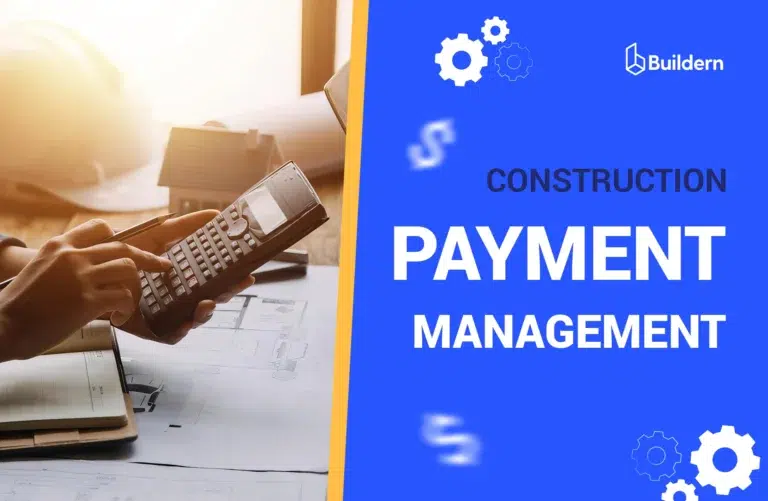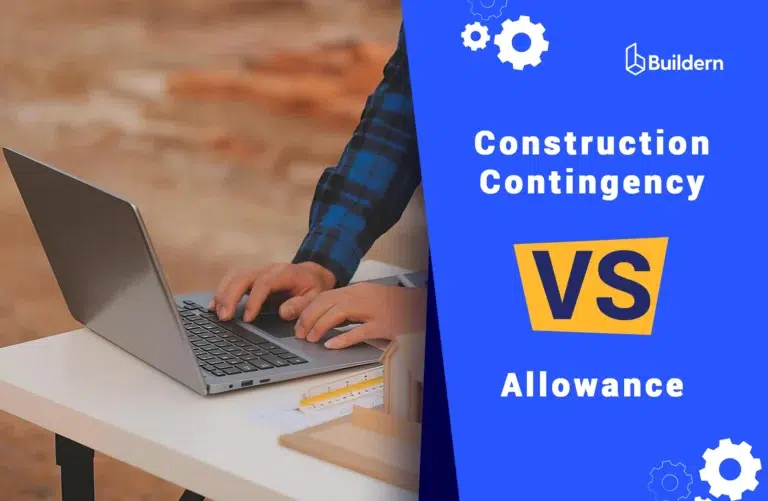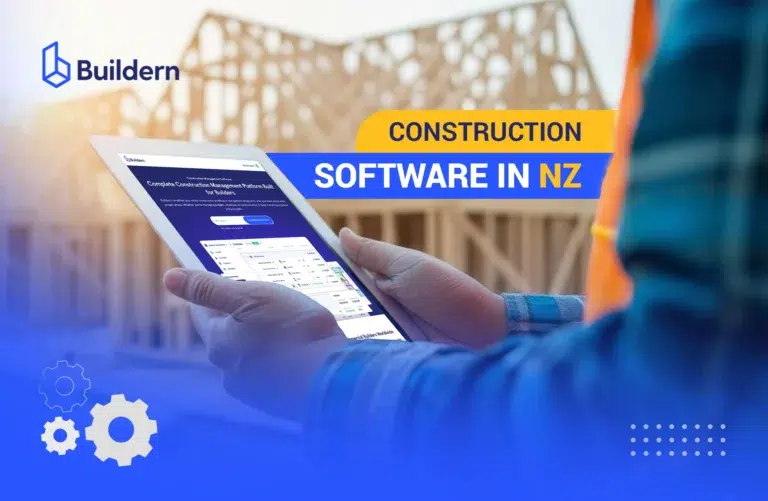What Is a Residential Construction Proposal?

Updated on December 15, 2025
Have you ever wondered how the most successful residential remodelers and custom home builders consistently secure the best and most profitable projects?
The secret lies in their construction proposal. A well-crafted proposal shows the potential clients the proficiency and willingness to work efficiently and transparently. It also helps to avoid any misunderstandings during the project completion phase.
On the other hand, I believe a poorly designed proposal can create more questions than answers. The reason is that construction proposals serve as both a sales brochure and a contract, making it crucial to provide accurate information while also persuading the client to choose your services.
In my article, I will discuss how to create residential construction proposals that impress clients, how to customize them, and answer all the questions that a client might have.
Table of Contents
- What is a Construction Proposal?
- Why a Strong Residential Construction Proposal Matters?
- Residential vs. Commercial Proposal
- Key Components of a Residential Construction Proposal
- Proposal Customization
- Tips for Creating a Winning Residential Construction Proposal
- Conclusion

TL;DR
- A residential construction proposal is a comprehensive document outlining a builder’s proficiency, approach, and dedication toward a project. It serves as a dual-purpose tool, being a contract and a marketing paper selling the contractor’s skills.
- Applying for projects with a professionally prepared residential proposal is crucial as it demonstrates your expertise and helps avoid potential misunderstandings during the project.
- There are several practical tips on crafting an effective residential construction proposal, which help win more construction projects.
What is a Construction Proposal?
A construction proposal is one of the most important documents a contractor prepares during the preconstruction phase. At its core, it’s a formal offer that outlines how you plan to execute a project. It’s a formal offer that includes different aspects of the scope of work and materials, timelines, pricing, and terms.
But in reality, a construction proposal is much more than an estimate or a sales pitch. It’s a strategic communication tool that demonstrates your professionalism, experience, and reliability long before any contract is signed.
More importantly, a strong proposal gives potential clients insight into your company’s expertise and working style. It reflects how you communicate, how you plan projects, and how seriously you take their investment. When done right, a construction proposal becomes a decision-making guide for the homeowner.
Why a Strong Residential Construction Proposal Matters
Whenever a homeowner wants to find a residential contractor, they need to be sure that the project will be completed according to their expectations.
The process usually implies meetings with several builders to find the most beneficial deal. It’s a crucial stage when building companies must perform their best to win the customer.

Here’s why a well-built proposal matters so much:
- Trust: Homeowners don’t think in terms of RFQs and procurement processes first; they think in terms of trust. A clear, professional proposal immediately shows that you’re organized and experienced.
- Project clarity: Unclear descriptions, vague allowances, and missing details are leaving the client frustrated. A detailed proposal sets expectations from day one.
- Faster approvals: When your proposal already answers homeowners’ most common questions, it shortens decision time and helps you move from inquiry to contract much faster. If it’s done with a reliable construction management software to shorten the time for approvals, it’s an extra benefit.
- Better budgeting and accurate expectations: Transparent cost breakdowns, realistic schedules, and well-defined specifications help clients budget confidently.
What happens when the proposal is unclear? A vague proposal leaves room for doubt as homeowners start wondering: Will the final cost be much higher? What exactly am I paying for? Are there hidden costs? Can this contractor handle my project?
Does it apply only in the case of commercial proposals? Let’s discuss the differences.
Residential vs. Commercial Proposal
The main difference between the types of proposals is that the homeowners are not industry professionals. They rely on the proposal to understand the scope, materials, timeline, and risks, but without construction knowledge.
Trust here plays a great role. Therefore, a residential proposal must demonstrate reliability, clear processes, and consistent communication. For example, an in-built messaging module in the construction software allows contractors and clients to exchange messages directly within the project.

This feature helps keep all communication organized in one place, saves time, and reinforces a professional, transparent approach to managing the project.
In contrast, commercial construction proposals often focus more on compliance, risk management, and formal procurement processes. Commercial clients typically have a construction background or dedicated procurement teams.
Their proposals need to include detailed technical specifications, contract terms, insurance, and other items. While trust is still important, in this case, the proposal serves as part of a formal bidding and contract process.
Key Components of a Residential Construction Proposal
Proposals can vary in style and depending on the essence of the project, but some points remain the same. Let me show you the essential components of the proposal for a residential construction project.
Company Information
Start your proposal with a clear introduction to your company. It’s up to you to include your business name, years of experience, licensing or certifications, and a brief description of your services.
Scope of work
This is the heart of the proposal. Clearly define what work will be performed, the materials to be used, and any specific tasks or services included in the project. A detailed scope of work ensures the homeowner understands exactly what they are getting.
Timeline with Milestones
Provide an estimated schedule for the project, including start and completion dates and key milestones along the way. Breaking the project into phases helps visualize progress.
Cost Breakdown
The expected costs for materials, labor, permits, and any other project-related expenses, based on bids from subcontractors and vendors. Itemizing costs makes your proposal transparent and builds trust with the homeowner. You can choose to include allowances for items that haven’t been finalized.
For example, it usually applies to fixtures, as the clients are more likely to make changes at this stage.

Payment Conditions
Outline the payment schedule, including deposit amounts, milestone payments, and final payment. Clear payment terms protect your cash flow while helping homeowners understand the financial commitment required at each stage.
Signature
Finally, include a signature page where both the homeowner and contractor agree to the terms of the proposal. In the construction software, you can easily provide a signature that will close the deal.
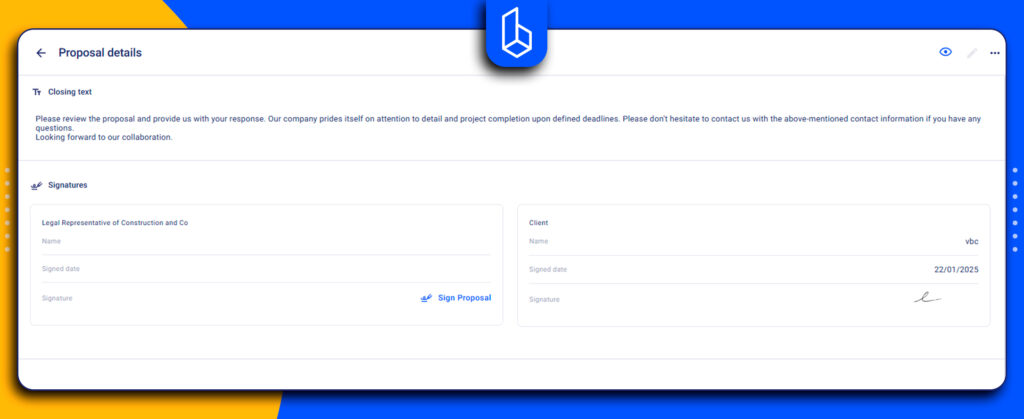
Proposal Customization
A residential construction proposal is not one-size-fits-all. Each homeowner and project is unique, and customization is essential. As a contractor, the ability to choose the format that will give me flexibility to highlight the details that matter most.
When generating a proposal in the construction management software, customization allows you to include or exclude specific elements based on the project and client preferences. You can choose the layoutFor example, it’s up to you to include allowances for items like fixtures or set fixed costs if selections are confirmed. Contingencies, insurance clauses, and terms & conditions can also be included or excluded depending on the homeowner’s expectations and project requirements.
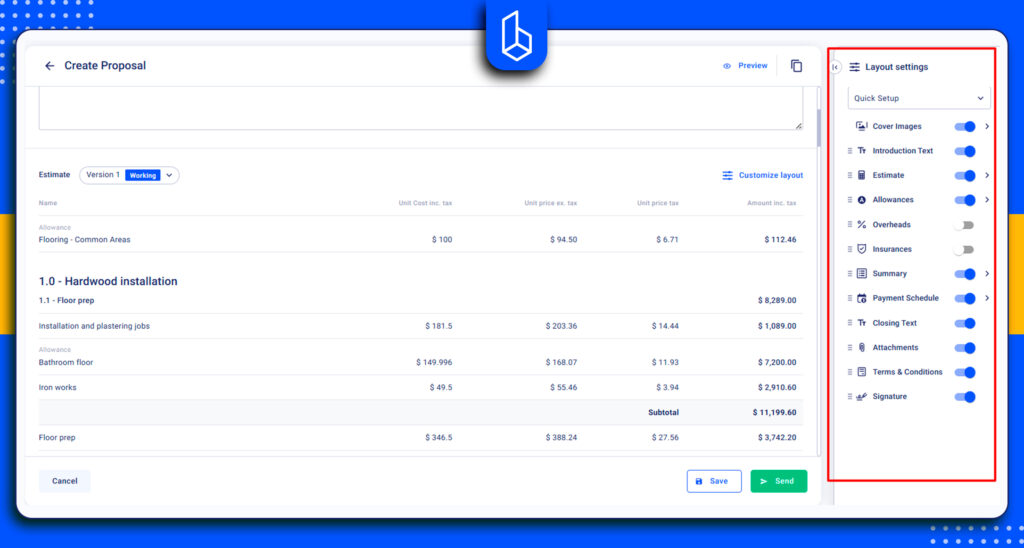
Here are some practical examples of customization you can apply:
- Introduction Text: Decide what tone and level of detail to include. A personal greeting or project overview can make the proposal more engaging.
- Financial Section: You can adjust whether taxes are included in unit prices, whether to show subtotals, or whether to display allowances and overheads.
- Summary & Closing Text: Make a summary to highlight your value proposition and emphasize timelines.
- Attachments: Include permits, certifications, or reference documents only if they are relevant or requested.
- Insurance, Terms & Conditions: You are to decide how much detail to show.
In short, homeowners feel that the proposal is made specifically for their project, which builds trust and confidence. At the same time, you maintain control over what information is shared.
Tips for Creating a Winning Residential Construction Proposal
We already know that a residential construction proposal is a document that presents services, along with cost and time estimations, to potential residential clients. Here are some tips on how to make it clear and precise.
Tip 1: Understand Your Client and the Site
Before you start drafting a residential construction proposal, take the time to fully understand both the homeowner and the project site.
This includes learning the client’s goals, budget expectations, design preferences, and timeline. Residential projects are personal, so understanding what matters most to the homeowner helps you generate the proposal accordingly.
At the same time, review site conditions, access limitations, existing structures, and any local zoning or permit requirements. Strong upfront research allows you to prepare a realistic scope, accurate pricing, and fewer assumptions.
So, at this stage, you set the foundation for a proposal that feels professional and meets the client’s expectations.
Tip 2: Prepare a Detailed Estimate
Gather bids from subcontractors and suppliers to base your costs on real market data. The more detailed cost breakdown you have, the better for the client.
For instance, instead of requesting a general electrical quote, you might specify the number of outlets, lighting fixtures, panel upgrades, and any smart home integrations. The same approach applies to material suppliers, where quantities, brands, and specifications directly impact pricing.
Clear, detailed estimates give clients confidence that your proposal is accurate and reliable.
Tip 3: Customize to Make It Stand Out Among Competitors
Make your proposal easy to read and understand. Choose what you show or hide: descriptions, contingencies, subtotals, or taxes, depending on how much transparency the client needs. Clear formatting and visual elements make your proposal more appealing and decision-friendly.
Tip 4: Define a Clear Payment Schedule
A strong proposal should include a clear payment structure. Breaking the total project cost into manageable milestones helps homeowners understand when payments are due.
In fact, payment schedules can be structured in different ways, such as fixed milestone amounts, percentages of the total cost, or percentages of the remaining balance.
Regardless of the approach, clarity is key. Well-defined payment terms protect your cash flow while reducing the risk of disputes or delayed payments during construction.
Tip 5: Review and Finalize Thoroughly
Before sending it, review the proposal carefully to ensure all scopes, costs, timelines, and conditions are accurate and consistent.
A clearly approved proposal creates a shared understanding of the project and sets the foundation for a smoother construction phase.
Step 6: Include a Reference to Your Previous Work
Attaching a brief portfolio with your past works can be a powerful argument to win the client’s trust. Primarily, if you’ve worked on projects similar to theirs, they might be more likely to accept your proposal.
Don’t go into many details. Include information about the quality of your previous projects, the references and feedback you’ve received. You can also mention the challenges you faced and how you coped with them. However, be careful not to include too much information.
| Do’s | Don’ts |
| Highlight a few relevant projects that demonstrate your expertise. | Overload the client with too many examples or full portfolios. |
| Focus on quality and positive outcomes. | Include unnecessary technical details or internal processes. |
| Mention client satisfaction, references, or awards if relevant. | Share confidential client information or negative feedback. |
| Keep it concise and visually appealing. | Turn it into a long narrative. |
Conclusion
The success of your business depends on many factors. Nevertheless, an accurate proposal is essential. Clients should feel secure and valued when they get your proposal.
As your goal is to present yourself as a professional and get the job, it’s crucial to develop a smooth workflow with your residential clients and stand out from other contenders. Try advanced tools that will customize each proposal according to your clients’ niche.
Unlike commercial proposals, in some cases residential proposals need to balance clarity with flexibility, with more items for discussion, customization, and client needs.

How to Write a Construction Proposal?
A construction proposal should be based on a detailed estimate and can be efficiently created using construction software. Buildern allows you to customize every section: scope of work, materials, labor, timelines, and costs, so the proposal meets the client’s specific needs.
What Should a Residential Construction Proposal Include?
A residential construction proposal should include company information, a detailed scope of work, a timeline with milestones, a detailed cost breakdown, and payment terms. Optional attachments and terms can also be added for clarity.
What is the Difference between a Commercial and a Residential Proposal?
Residential proposals focus on trust, clarity, and personalization for homeowners, explaining scope, materials, timeline, and costs in simple terms. Commercial proposals highlight technical details, compliance, and risk management. Residential is more flexible; commercial is more structured and formal.
